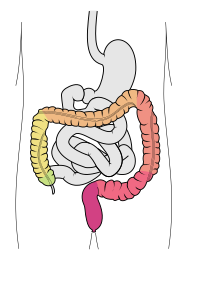
Photo from wikipedia
Ulcerative colitis (UC) is defined as an idiopathic inflammatory disorder primarily involving the mucosa and submucosa of the colon. UC-associated colon cancers (also known as colitic cancers) develop through the… Click to show full abstract
Ulcerative colitis (UC) is defined as an idiopathic inflammatory disorder primarily involving the mucosa and submucosa of the colon. UC-associated colon cancers (also known as colitic cancers) develop through the inflammation–dysplasia sequence, which is a major problem affecting the prognosis of patients with UC. It is therefore very important to detect malignancy from UC at an early stage. As precancerous lesions arising in UC, there are pathological adenomatous changes, basal cell changes, in situ anaplasia, clear cell changes, and pan-cellular change. It is considered that the mutation of the p53 gene plays a crucial role, and the protein expression of p53 in dysplastic crypts may serve as a good biomarker in the early stages of UC-associated colon carcinogenesis. Immunohistochemistry for p53 is a very valuable diagnostic tool in UC-associated colon cancers. However, protein expression of p53 is not always universal, and additional methods may be required to assess p53 status in UC-associated colon cancers.
Journal Title: International Journal of Molecular Sciences
Year Published: 2017
Link to full text (if available)
Share on Social Media: Sign Up to like & get
recommendations!